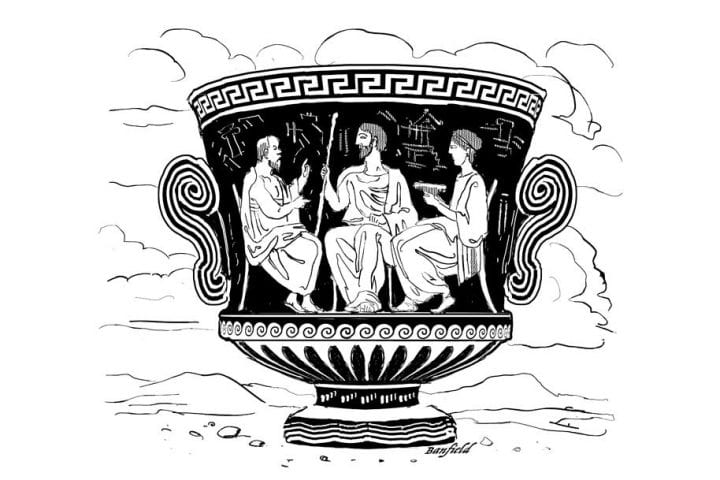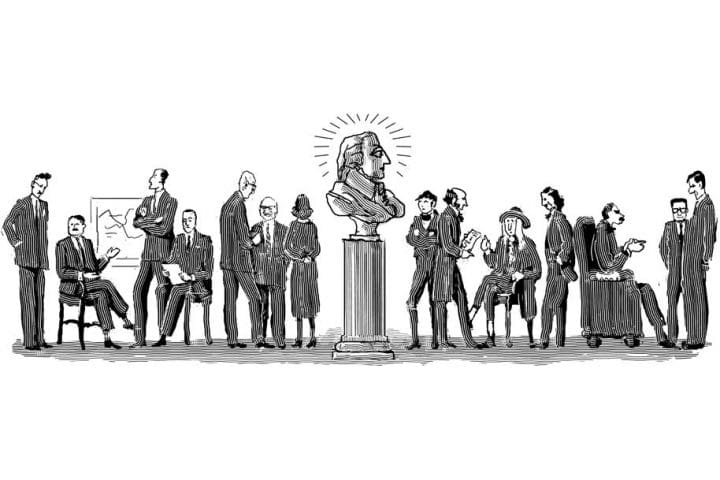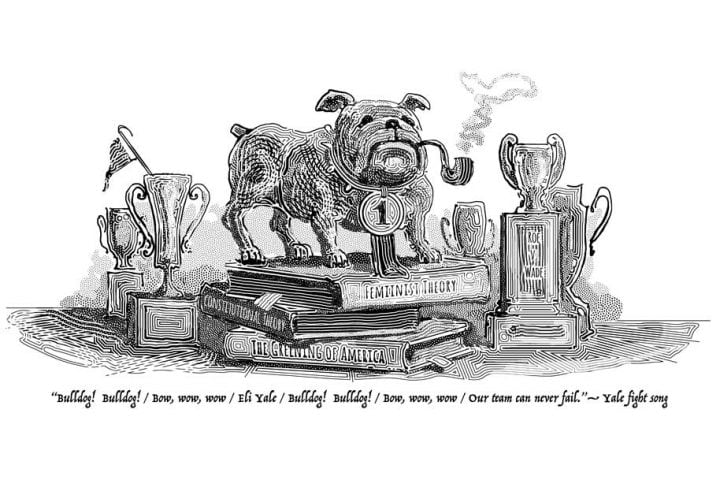Books Reviewed
 ome political thinkers hold that commerce may advance the national welfare but makes bad citizens. The pursuit of profit, in this view, indulges a narrow self-interest inimical to the public good. It produces citizens who would willingly trade dignity, their own and their country’s, for another dollar.
ome political thinkers hold that commerce may advance the national welfare but makes bad citizens. The pursuit of profit, in this view, indulges a narrow self-interest inimical to the public good. It produces citizens who would willingly trade dignity, their own and their country’s, for another dollar.
This view contrasts commercial egoism with republican virtue, which is willing to sacrifice self-interest to advance the common good. Martial virtues tend to predominate in the defense of liberty and independence, both personal and national. And because these virtues predominate, they preserve liberty and independence even as commercial republics lose theirs.
Utah State University political scientist Anthony A. Peacock rejects this critique. Or, more accurately, Peacock believes that Alexander Hamilton, John Jay, and James Madison reject it. In Vindicating the Commercial Republic: The Federalist on Union, Enterprise, and War, Peacock interprets The Federalist as an argument that national greatness and the commercial spirit work in tandem rather than at cross-purposes. Commercial republicanism manifests the restless energy that aspires to conquest and glory, but redirects it, channeling it into enterprise. Thus occupied, it better secures liberty and independence than the martial virtues do in societies dedicated to them. Even then, commercial republicanism need not trade away military readiness to achieve national prosperity. Rather, the spirit of commercial republicanism allows superior realization of martial virtues where and when needed.
Peacock makes three particularly significant arguments. First, American character in the commercial republic reflects strength, virtue, and energy. Second, the weakness of the national government under the Articles of Confederation diminished Americans’ liberty by allowing, and often necessitating, excessive restrictions on commercial activity. Third, the creation of a standing army better secures liberty, and promotes virtue and prosperity, relative to dependence on a system of citizen-soldiers organized in militias.
Concerning character, Peacock writes that Publius rejects any tradeoff between virtue and commerce. In the commercial republic, business promotes virtue, and vice versa. The Constitution encourages what Peacock terms a “virtue of enterprise,” reflecting a set of attainable, self-sustaining virtues. Among them, Peacock lists “[i]ndustry, innovation, economy, self-restraint, honesty, prudence, temperance, firmness, vigilance, and an appreciation for free, limited government constitutionalism.” The Constitution for Publius was “not only a political but a moral necessity.”
* * *
For Peacock, the virtues of classical republicanism would require government intervention in people’s lives exceeding the boundaries conducive to constitutionalism. The commercial republic cannot flourish unless government regulation and control are somewhat limited. But creating a larger national government, more energetic and powerful than the United States had known under the Articles of Confederation, would increase (paradoxically) Americans’ freedom. To take one important area, the Articles allowed but the Constitution prevented interstate protectionism, which inhibited commerce, prosperity, and the development of the commercial republic’s distinctive virtues.
Finally, in Peacock’s reading of Publius a national standing army would increase liberty, not decrease it. As with national regulation of commerce, placing monopoly control of the military in the hands of a single national government would reduce the threat of state- or regional-level conflicts among Americans. Furthermore, a standing army, unlike state militias, would free up men’s labor for production and commerce: professionals would fight better than amateurs, and the time amateurs devoted to training could instead be dedicated to production.
Peacock’s analysis of The Federalist is not merely historical. He seeks to vindicate the commercial republic for America today. Though this, too, is a worthy project, Peacock sometimes gives his reader cause to believe that he is ascribing his own views to Publius more than he is interpreting The Federalist. For example, he suggests that Madison in Federalist No. 10 sees the Constitution as a tool that would channel religious and political conflicts into economic conflict in order to “tame or devitalize” them. That goes beyond anything Madison actually says there. Similarly, in asserting that “Publius did not accept that self-sacrificing virtue could ever be the foundation of republican government,” Peacock draws the lines too starkly. After all, the commercial republic’s virtues require self-sacrifice as well, just not in the same degree as classical republicanism. It is difficult to believe the virtue of republican commercialism was intended to be as totalizing, and as foundationally secular, as Peacock portrays.
* * *
So, too, the arguments in The Federalist regarding national jurisdiction over commerce and trade are more equivocal than Peacock suggests. State competition, for example, resulted in lower tariff revenues overall. Merging power over tariffs into a national government eliminated the tax-lowering state competitions and enabled the imposition of a higher effective tariff. Adam Smith’s analysis in The Wealth of Nations would hold that this result, on balance, hindered America’s economic development.
None of these observations detract from the many virtues of Vindicating the Commercial Republic. Peacock identifies a theme in The Federalist that too many scholars have ignored. Rereading Publius in light of the argument that the commercial republic is a positive good rather than a necessary compromise reveals significant insights previously ignored. I have no doubt that America would be better off—not only economically but politically and socially—if the entrepreneurial spirit Anthony Peacock identifies were renewed.




